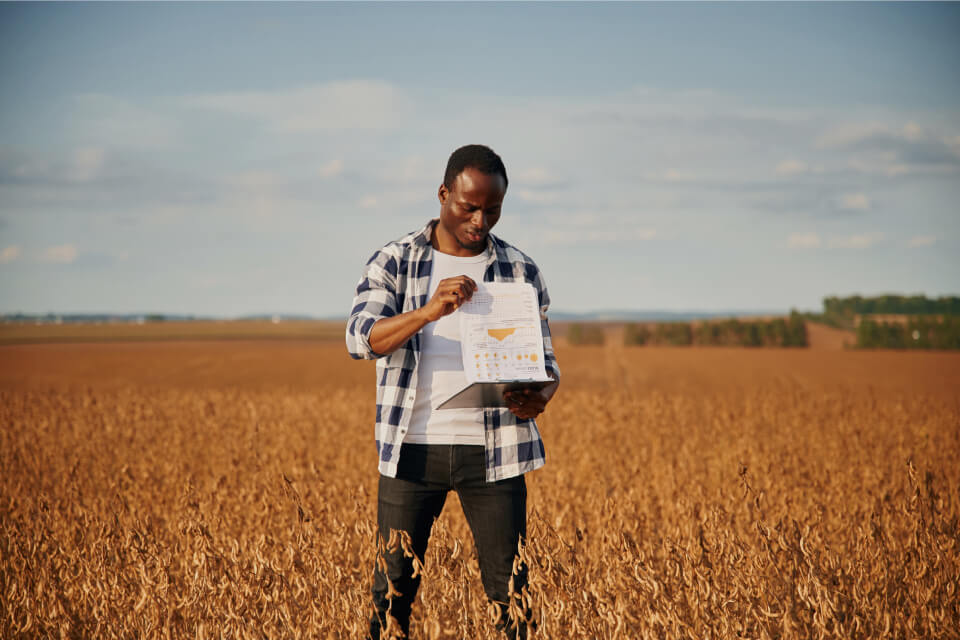Introduction
Do you have plans to be an agripreneur in Africa? Agripreneurship means mixing agriculture and business to make profits. But before you start growing crops or raising animals, there’s one very important step, the foundation of it all – getting land. Land is everything! If you’ve heard that before, you know it’s true, especially in farming. It is difficult to acquire land for a lot of reasons. From this guide, you will understand how to secure land for agripreneurship in Africa. You will also learn what to check before you buy or rent the land so that you don’t make mistakes. Ready to learn how to secure land for agripreneurship? Let’s get started!
Definition of Agripreneurship and Its Importance in Africa
Agripreneurship is the combination of agriculture and entrepreneurship. It is the incorporation of business ideas in agriculture. It is not just farming, but everything in food production and distribution – from planting and harvesting to processing and marketing products. Agripreneurs always think of newer ways of farming, waste reduction, and profit increase.
Why is This Important in Africa?
Agribusiness is one of the biggest employers. With more agripreneurship, there can be job creation, poverty reduction, and economic development. Moreover, Africa can feed more people, even exporting its produce to other countries. As more young men and women embrace agripreneurship, the role of agripreneurship in African food security will increasingly become very strong.
The Role of Land in Agricultural Ventures
Anything that has to do with agriculture definitely involves land. Land is the basis of every farm business. That is where you grow crops, raise animals, and even erect factories for food processing. Without land, farming cannot take place.
The size and quality of the land determines the level of production and profit you will have. Land management is also important so that future generations can use the land. Before you start farming, getting the right land should be your first focus.
Challenges Faced by Agripreneurs in Securing Land
Land security in Africa is not an easy task. Some major
challenges include:
- Issues with Land Ownership: In some cases, there is no clear owner of the land. Getting proper documentation for land that is family or community-owned can be very difficult.
- High Demand for Land Ownership: Many people are going into land acquisition, not just for farming but to get into the real estate industry. This makes competition stiff.
- Financial Issues: Buying or leasing land might be expensive. Most young agripreneurs do not have enough funds for farming activities or land security. You can check out funding opportunities for African agripreneurs and see how they can help.
- Legal and Government Regulations: The legal status of lands is different in every country. Some lands are restricted, and obtaining licenses can be time-consuming. It is advisable that agripreneurs learn all the laws and regulations that have to do with securing land.
These factors may pose a challenge, but with proper information, you should be able to get through them.
Overview of Key Considerations before Acquiring Land
Before acquiring land, either by buying or renting, ensure you do your research. Here are some of the key things to check:
- Land Ownership & Title: Let there be proper documentation of the land. Find out if the land is disputed by anyone. This will save you from legal issues in the future.
- Soil & Climate: Is the land suitable for agriculture? Check the type of soil, rainfall, and temperature to see if it’s suitable for your crops or animals.
- Location & Infrastructure: How accessible is the land? Is there road, water, and electricity access? Good infrastructure makes farming easy.
- Market Access: Can you sell your produce with ease? Land near markets reduces transport costs and losses. You can read up on How to Start an Agribusiness in Africa.
- Legal Rules: Are there any government restrictions on the land? Do you need any special permits?
- Cost: Can you afford it? Consider the price and extra costs like taxes and legal fees.
Understanding Land Tenure Systems in Africa
If you want to start your farm business in Africa, one thing you shall do right away is secure land. However, issues of land ownership in Africa are not that simple. Different places have different rules, and if one doesn’t understand them, they might pose a problem later. Learn about the land tenure systems before commencing your Agribusiness.
Traditional/Customary Land Ownership Structures
Land in most parts of Africa is not always easy to buy and sell at will. It actually belongs to communities or families and is passed on over generations. This is known as customary land ownership. The village chief or elders (in the family) usually are in charge of the land and do decide who may use the land or not.
For farming on customary land, you may be required to:
- Consult with the community leaders
- Observe traditional rules. Gifts or rituals are also considered as a form of respect
It is not as easy as just signing on a piece of paper. So, before investing in land, make sure you understand the customs and traditions of the area.
Freehold vs. Leasehold Land Tenure Systems
Freehold means you own the land forever. You can sell it, pass it to your children, or use it however you like. This gives you full control and security.
Leasehold will give you only the right to use the land for a period of time, such as 10, 50, or 99 years. After the period, the land shall revert to the owner.
If one does not have sufficient funds to purchase land, then leasehold may be the option. In case you want full control over your farm, then freehold will be the better option.
Government-Owned and Communal Land Policies
Large portions of land in some places are owned by the government and rented or leased out for farming or public projects. Other lands are communal, belonging to no one person but used by many people.
Government policies on land are different from country to country. Some governments encourage agripreneurship by giving land to farmers, while others have strict rules that limit accessibility to land. Hence, you have to:
Research your country’s land policies
Find out if there are any government programmes aimed at assisting farmers
Learn about the legal steps involved in acquiring land

Challenges of Land Tenure Security and Disputes
One big problem for agripreneurs in Africa is land disputes. Many people do not have clear ownership of their land, and this can cause fights over who has the right to use it. Some common issues include:
- Boundary Disputes: cases when people argue about the borders of the land belonging to them.
- Claims of Ownership: when someone claims that the land belongs to him or her.
- Lack of Documents: When land has no proper papers proving the ownership.
These can delay your farming business and even cause financial loss. In order not to have these problems, you should:
- Get legal advice before buying or leasing land,
- Obtain the land with official documents, and
- Get the right authorities to prove ownership
Understanding land tenure systems is very important for agripreneurship in Africa. Before securing land, make sure you do proper research.
Navigating Legal and Regulatory Requirements
Being able to make sense of the rules is crucial to understanding how to secure land for agripreneurship.
Key Land Ownership Laws and Regulations by Region
Not all land ownership laws are the same in Africa, and what is permissible in Nigeria may not be permissible in Kenya or South Africa. It is these laws that explain who can and cannot own land, how land can be transferred, and the rights and responsibilities of landowners.
Some places follow traditional customs, and other places make use of modern legal systems. In some countries, only citizens can own land, while others allow foreign investors to buy land. There are also regulations on what the land can be used for. Do your research and understand the land laws in your area before you make any decisions.
If you are thinking of how to start an agribusiness in Africa, understanding these laws is the first step.
Process of Land Registration and Titling
Land registration involves the formal documentation of the owner of a given land. Titling refers to obtaining a legal document proving land ownership. This is important because it offers security for the ownership rights of an individual and even gives him rights to sell, lease, or even use the land for a loan.
Each country has its own process in terms of land registration. You may have to:
- Go and lodge some documents with a government office.
- Pay some fees and dues.
- Have a survey of the area to identify the size and boundaries of the land.
This can be a time-consuming procedure, but it is very vital. In the absence of proper registration, people may claim your land and you might lose it! To make sure of land for your agribusiness, have the land legally registered in your name.
Environmental and Zoning Regulations for Agribusiness
Environmental regulations are laws that preserve nature, including water sources, forests, and wildlife.
Zoning regulations determine the use of land. Some lands are meant for farming while others are for housing or factories.
Before you start your agribusiness, find out if your land is zoned for farming. You may need to:
- Apply for permits.
- Undertake an environmental impact assessment.
- Observe specific farming rules for environmental protection.
These regulations will make your business sustainable and ensure farming does not destroy the land. If you are interested in the future of agripreneurship in Africa, then these are some of the key things to know.
The Role of Local Authorities and Land Commissions
Normally, land management is undertaken by the local authorities, such as government councils, and also by land commissions. These agencies serve to implement land policies, solve land disputes, and also keep land records.
They will be able to provide you with information on land ownership and legal processes. A good relationship with them will ease your land acquisition process. In case any problem arises, they could also help you solve it. So, ensure you work with them!
With the proper knowledge, your agribusiness will be grounded on a good foundation to take it through to success.

How to Negotiate Land Leases and Purchases
Securing land for an agribusiness is one of the most important steps in starting an agribusiness in Africa. It requires knowing the right steps to make a decision that will be ideal for your agripreneurship journey.
Key Factors to Consider before Leasing or Buying Land
Before doing anything, you have to reflect on your decisions. There’s a difference when leasing or buying land. There are also pros and cons involved in each process.
Land purchase means the land will belong to you totally, and with it, you can do all that you will. But these are costly, and this engagement requires quite a substantial capital.
Land leasing is cheaper at the outset, but you don’t own it. You will have to renew the lease after a certain time, and the owner may or may not extend it.
Other things to consider include:
- Location: The area affects the cost and accessibility of your farm.
- Budget: How much can you afford? Be realistic about your finances and financial management
- Business Objectives: Is this a long-term or short-term investment?
- Risk: What are the risks involved, and are you able to handle them?
Take your time and speak to professionals, advisors or whomever you need to before making any decisions.
Steps to Conduct Due Diligence on Land Ownership
Due diligence means checking everything to make sure the land is legit and secure. You don’t want to buy or lease land and later find out there are problems. Here’s how you do it:
- Check the Land Title: Ensure the seller or landlord actually owns the land.
- Survey the Land: Get a professional surveyor to confirm the land size and boundaries.
- Seek the Local Authorities: You’ll need them to understand the zoning laws and environmental restrictions.
- Speak with the Neighbors. They can also inform you about the place’s history or any earlier problems.
- Check on any Dispute: Ensure that no other claimant comes to move for the piece of land.
These actions would help save one from a lot of huge problems afterward.
Negotiation Strategies for Securing Favorable Lease Terms
In any business dealing, there is always space for negotiation. The same applies to land acquisition. You have to be smart, know what you want and negotiate a great deal. Here are some tips:
- Know the Market Price: Find out what the price of land goes for in that area.
- Be Prepared to Walk Away: If the price is too high, don’t be afraid to walk away.
- Highlight your Value: If your farm is going to create jobs or help the community, mention it. Don’t hide your plans for the land.
- Negotiate More Extended Ease Terms: Ask for lower prices, a longer lease period, or flexible payment terms.
- Be Polite but Firm. Do not let anyone take advantage of you. Make your points without being rude.
Everything is negotiable, so don’t be shy to ask for better terms.
Importance of Contracts and Legal Agreements in Land Acquisition
A contract is a written agreement between you and the landowner. This provides protection for your rights and a guarantee that everybody observes an agreement. A good contract should contain:
- Price or lease amount
- Payment terms
- Time of lease or transfer of ownership
- Terms of renewal or termination
- Arbitration clauses
- Dispute resolution clauses
Have a lawyer go over anything before you sign to ensure that you are covered. Better safe than sorry!
Securing land is one of the key steps to commencing an agribusiness in Africa. If well done, land acquisition will be a step toward successful agripreneurship and a contribution to food security in Africa.
The Role of Community and Government Support
This is where you learn how to seek assistance from people in your surroundings. This also involves the government too.
Importance of Engaging with Local Communities and Stakeholders
It is not advisable to simply start an agribusiness alone. You need the local community and stakeholders for support. They are people is the area you plan to have your agribusiness. They can either support or create difficulties for you.
Building good relations with them might provide you with access to land, workers, and resources. Besides, it is also a way to avoid conflicts and build trust. Attend community meetings, listen to what people say, and involve them in your plans. Let them know that you are not there just to make money but also for the growth of the community. If respect goes from your side, they will do the same.
Government Programs and Incentives for Agripreneurs
The government has various programs to assist the agripreneurs. These include grants, loans, tax breaks, and training programs. If you get access to them, you can reduce your costs and increase your profits. Look into government-supported funding opportunities for African agripreneurs.
Identify what government agencies promote agriculture at your location. Use their websites, attend their workshops, and speak with their representatives. Some government initiatives can support you on how to secure land for agripreneurship. Acquiring this support makes the agribusiness journey smoother.
Role of Cooperatives and Farmer Associations in Land Acquisition
Cooperatives and farmer associations are organizations of farmers with the same goals. They help to attain land, machinery, and market accessibility. They also offer training, counseling, and support.
With a cooperative, you get collective bargaining power for land acquisition. They are also able to advise you through most of the legal and regulatory processes.
Lastly, networking provides you with opportunities to learn from other farmers through sharing experiences and knowledge.
Conflict Resolution Strategies for Land Disputes
Even when one does everything right, land disputes are likely to come up. And when these come up, there must be ways to solve them peacefully.
The first thing is always to try to negotiate with the other party and hear the other side.
Secondly, you can look into mediation by a neutral third-party mediator to help iron things out between the parties.
As a last resort, you can consider consulting with legal attorneys. However, resorting to the court has to be the very last thing in your options, as it usually is extremely time-consuming and, above all, expensive.
The key is to remain calm and respectful, while seeking a solution that benefits everyone.
With this information, you will now be able to understand how to secure land for agripreneurship and build a strong agribusiness that is meant to keep benefiting you and your community.

Tips for Securing and Managing Land for Agribusiness
If you want to run a successful agribusiness, then you are going to need to make sure that your land is secure and productive for many years.
Best Practices for Long-Term Land Security
One has to follow the proper steps for keeping their land safe and functional for years.
- Proper Documents are Needed: One needs to ensure that the land is registered and that a clear title exists. This will keep one safe from any disputes about land.
- Build Good Relations: Be friendly with your neighbors and community. This will help you avoid conflicts and even form a bond of trust.
- Secure Your Land: You can do this by putting up fencing, periodic surveillance, and reporting illegal activities to concerned authorities.
- Pay Your Taxes in Time: Late payment can lead to you being fined, which may result in the complete loss of the land.
- Diversify your sources of income: Avoid dependence on just farming. Have additional means for obtaining an income by reducing risks.
Sustainable Land Use and Conservation Strategies
Land use in a sustainable manner is using land in a way that does not harm the environment. Conservation strategies are effective methods for protecting and restoring land.
- Crop Rotation: It prevents the depletion of the soil because one changes the crops often enough.
- Cover Crops: These prevent soil erosion.
- Efficient Irrigation: Use of irrigation systems and collection of rainwater to avoid wastage.
- Eliminating Risky Chemicals: Pesticides may contaminate soil and water, so less harmful alternatives must be considered.
By observing the tips, you are assured to reap from your land in the long run. Sustainable farming also contributes to the role of agripreneurship in African food security.
Leveraging Technology for Land Mapping and Monitoring
Technology has made land management easier and more efficient.
- GPS Mapping: To determine land boundaries more precisely.
- Drones: For checking the health of crops, locating pests, and land conditions.
- Remote Sensing: Provides information on soil moisture and vegetation cover.
- Geographic Information Systems (GIS): Allows analysing and visualising land data for better planning.
These will enhance efficiency, reduce costs, and increase productivity. One cannot overemphasize the importance of technology in African agripreneurship.
Financial Planning for Land Acquisition and Development
Acquiring land and developing it requires good financial planning.
- Make a budget: Preplan for the cost of land, registration cost, and expenses for development.
- Look for Funding: loans, grants, investment.
- Cash flow planning allows you to have an overview of your income and expenses over a certain period of time.
- Invest wisely in buying equipment and infrastructure that will upgrade your business.
- Manage risks by getting insurance and finding other ways to earn money.
If you need funding, check funding opportunities for African agripreneurs. With the right support, the future of agripreneurship in Africa is indeed bright.
Frequently Asked Questions (FAQs)
1. Why is securing land necessary for agripreneurship?
Securing land is vital for agripreneurship as it offers the necessary space to cultivate crops or raise livestock. Without access to land, running an agribusiness becomes nearly impossible.
2. How can I find available land for agripreneurship?
To locate available land, you can explore local real estate listings, connect with farmers, or attend agricultural fairs. Additionally, online property platforms can be pretty useful.
3. What factors should I consider when choosing land?
When selecting land, consider soil quality, water availability, climate conditions, proximity to markets, and transportation access. These elements influence your ability to grow crops successfully.
4. What legal documents do I need to secure land?
If you are purchasing land, you will generally require a lease agreement or a title deed. It’s essential to ensure that all documents are legally binding and to verify any restrictions on land use.
5. What should I do if I face challenges in securing land?
If you encounter obstacles, consider seeking advice from seasoned farmers or agricultural organizations that can provide guidance and support during your search.
Conclusion
In summary, understanding how to secure land for agripreneurship is crucial for anyone aiming to launch an agricultural venture. By familiarizing yourself with the process of finding appropriate locations, considering legal obligations, and looking into financial options like leasing or government assistance, aspiring agripreneurs can pave the way for success in this fulfilling industry. Remember: every significant journey starts with a single step so take yours today!



